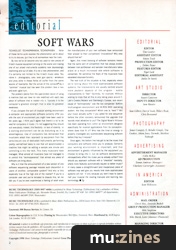Magazine Archive
Home -> Magazines -> Issues -> Articles in this issue -> View
Soft Wars | |
Article from Music Technology, April 1990 | |
Technolust or techno paranoia - when does the love of technical development turn into fear of your gear becoming outdated? Tim Goodyer takes a short course in techno-psychotherapy.
TECHNOLUST. TECHNOPARANOIA. TECHNOPHOBIA... None of these terms quite express the phenomenon we're about to try to discuss, put they're all somewhere near the mark.
By now we've all become only too used to new pieces of hi-tech musical equipment arriving on the scene and making one of our prized instruments suddenly look depressingly restricting and out of date. It's not a new phenomenon, and it's certainly not limited to the hi-tech music area. You name it - photography, cars, even gun sports - amateurs and pros alike in these fields all suffer from the same source of heartache. But the arrival of the computer as a "common" musical tool has seen this problem take a new and even uglier turn.
The problem stems from the open-ended nature of using a machine that can have its role redefined with each new piece of software that is loaded into it. Typically it is the computer's greatest strength that is also its greatest weakness.
If you compare the sort of musical working environment a computer and appropriate software currently offer you with the sort of environment you might have been used to ten years ago. I think you'll agree that there's a lot to be said for computers in music. I'm not suggesting they should suit everybody: indeed, this flexibility - or lack of stability - in a working environment can be as disturbing as it is advantageous. Use of computers has demanded that musicians adapt their approach to equipment from the centuries-old one of dedicated instruments performing (pretty) well-defined tasks to one that will accommodate a machine that might be editing a sample one minute and controlling a mix the next. This many musicians have managed. What almost all musicians have not managed is to control this "technoparanoia" that almost any piece of software can bring about.
Why is it that the announcement of a new version of one software sequencing package induces such discomfort in users of another, comparable system? And why is this especially true at the high end of the market? If you're a computer user and you're tempted to dispute this, let me ask you if you've ever experienced a feeling of relief when the manufacturers of your own software have announced their answer to their competitors' innovations? Why else should that be?
Again, this mixed blessing of software revisions means that the same sort of competition that has always existed between rival synthesiser and sampler manufacturers takes place at a much increased rate where software is concerned. Yet somehow the fears of the musicians have escalated disproportionately.
The real truth of the situation is that, especially where we're talking about the more sophisticated software systems, the improvements are usually centred around more esoteric aspects of the program - subtle improvements in "feel" facilities, for example. Without wishing to imply that all this is only taking place around C-Lab's Creator/Notator and Steinberg's Cubase, one recent cause of "technoanxiety" was the two companies' Softlink multi-program environment and M.ROS MIDI operating system. Are they comparable? Which one is "best"? Will your music actually suffer if you opted for one sequencer before the other company announced the upgrade that sounds most attractive to you? The Digital Muse's Virtuoso has been operating from within an environment designed specifically for musical applications from its conception, where does that fit in? Who has the time or energy to properly investigate any sophisticated sequencing software before they buy it anyway?
Once again, the bottom line has got to be the music that computers and software allow you to produce. Certainly your working environment is important, and that environment is greatly influenced by the equipment you choose to bring into it. but do software developments retrospectively affect the music you've already written? And should you approach software with a "checklist" mentality, where more features automatically equate to better music? In many cases a straightforward (and inexpensive) piece of software may well give you results that more sophisticated systems will not - if only because you don't have to spend half your musical life reading manuals and learning new terminology.
Publisher: Music Technology - Music Maker Publications (UK), Future Publishing.
The current copyright owner/s of this content may differ from the originally published copyright notice.
More details on copyright ownership...
Editorial by Tim Goodyer
Next article in this issue:
> Newsdesk
Help Support The Things You Love
mu:zines is the result of thousands of hours of effort, and will require many thousands more going forward to reach our goals of getting all this content online.
If you value this resource, you can support this project - it really helps!
Donations for September 2025
Issues donated this month: 0
New issues that have been donated or scanned for us this month.
Funds donated this month: £0.00
All donations and support are gratefully appreciated - thank you.
Magazines Needed - Can You Help?
Do you have any of these magazine issues?
If so, and you can donate, lend or scan them to help complete our archive, please get in touch via the Contribute page - thanks!


